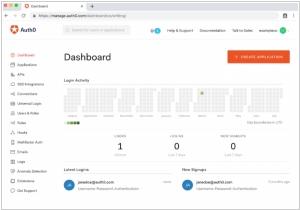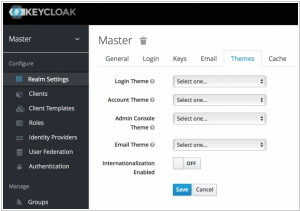Auth0 vs Keycloak
August 06, 2023 | Author: Michael Stromann
Auth0 and Keycloak are both popular open-source identity and access management (IAM) solutions that provide authentication, authorization, and user management capabilities for applications and APIs. However, they have some differences in terms of their offerings and focus:
Cloud vs. Self-Hosted: Auth0 is a cloud-based IAM solution that is offered as a Software-as-a-Service (SaaS) model. It provides a fully managed IAM service that is hosted and maintained by Auth0, eliminating the need for organizations to deploy and manage their own IAM infrastructure. On the other hand, Keycloak is a self-hosted IAM solution that requires organizations to deploy and manage their own IAM infrastructure on their own servers or cloud infrastructure. This can provide more control and customization options for organizations, but also requires more setup and maintenance efforts.
Features and Extensibility: Auth0 and Keycloak both offer a wide range of features for authentication, authorization, and user management, including support for various protocols like OAuth, OpenID Connect, SAML, and others. However, Auth0 is known for its extensibility and ease of integration with other third-party services and providers, with a large ecosystem of pre-built integrations and extensions. Auth0 also offers a wide range of identity providers out-of-the-box, including social media logins, enterprise identity providers, and multi-factor authentication (MFA) options. Keycloak, being an open-source solution, provides flexibility in terms of customization and extensibility, allowing organizations to tailor the solution to their specific needs by building custom extensions and integrations.
Deployment and Scalability: Auth0 is a cloud-based solution that is highly scalable and provides global availability with data centers located in various regions worldwide. It offers a multi-tenant architecture that allows organizations to securely isolate their tenant data in a shared environment. Keycloak, on the other hand, requires organizations to deploy and manage their own IAM infrastructure, which provides more control but also requires more effort for setup, configuration, and maintenance. The scalability of Keycloak depends on the infrastructure and resources allocated by the organization, which may require additional planning and provisioning to ensure optimal performance and availability.
Commercial vs. Open Source: Auth0 offers a commercial SaaS product with a free tier and various paid plans that provide different levels of features and support. Auth0 also offers a comprehensive set of documentation, support, and SLAs for its customers. Keycloak, on the other hand, is an open-source IAM solution that is free to use, modify, and distribute under the Apache License 2.0. It has an active community of users and contributors that provide support through community forums, mailing lists, and other community-driven channels.
User Experience and Administration: Auth0 provides a modern and user-friendly interface for managing users, applications, and configurations through its web-based dashboard. It also offers a variety of options for customizing the login and registration screens to match the branding and requirements of the organization. Keycloak, being a self-hosted solution, provides a web-based administration console for managing users, realms, applications, and other configurations. The user experience and administration in Keycloak may require more technical expertise and familiarity with the underlying technology stack compared to Auth0.
In summary, the main differences between Auth0 and Keycloak include their deployment models (cloud vs. self-hosted), features and extensibility, scalability, commercial vs. open-source licensing, and user experience/administration. Organizations should carefully consider their specific requirements, including deployment preferences, extensibility needs, customization options, scalability, and licensing considerations when choosing between Auth0 and Keycloak for their IAM needs.
See also: Top 10 Identity Management platforms
Cloud vs. Self-Hosted: Auth0 is a cloud-based IAM solution that is offered as a Software-as-a-Service (SaaS) model. It provides a fully managed IAM service that is hosted and maintained by Auth0, eliminating the need for organizations to deploy and manage their own IAM infrastructure. On the other hand, Keycloak is a self-hosted IAM solution that requires organizations to deploy and manage their own IAM infrastructure on their own servers or cloud infrastructure. This can provide more control and customization options for organizations, but also requires more setup and maintenance efforts.
Features and Extensibility: Auth0 and Keycloak both offer a wide range of features for authentication, authorization, and user management, including support for various protocols like OAuth, OpenID Connect, SAML, and others. However, Auth0 is known for its extensibility and ease of integration with other third-party services and providers, with a large ecosystem of pre-built integrations and extensions. Auth0 also offers a wide range of identity providers out-of-the-box, including social media logins, enterprise identity providers, and multi-factor authentication (MFA) options. Keycloak, being an open-source solution, provides flexibility in terms of customization and extensibility, allowing organizations to tailor the solution to their specific needs by building custom extensions and integrations.
Deployment and Scalability: Auth0 is a cloud-based solution that is highly scalable and provides global availability with data centers located in various regions worldwide. It offers a multi-tenant architecture that allows organizations to securely isolate their tenant data in a shared environment. Keycloak, on the other hand, requires organizations to deploy and manage their own IAM infrastructure, which provides more control but also requires more effort for setup, configuration, and maintenance. The scalability of Keycloak depends on the infrastructure and resources allocated by the organization, which may require additional planning and provisioning to ensure optimal performance and availability.
Commercial vs. Open Source: Auth0 offers a commercial SaaS product with a free tier and various paid plans that provide different levels of features and support. Auth0 also offers a comprehensive set of documentation, support, and SLAs for its customers. Keycloak, on the other hand, is an open-source IAM solution that is free to use, modify, and distribute under the Apache License 2.0. It has an active community of users and contributors that provide support through community forums, mailing lists, and other community-driven channels.
User Experience and Administration: Auth0 provides a modern and user-friendly interface for managing users, applications, and configurations through its web-based dashboard. It also offers a variety of options for customizing the login and registration screens to match the branding and requirements of the organization. Keycloak, being a self-hosted solution, provides a web-based administration console for managing users, realms, applications, and other configurations. The user experience and administration in Keycloak may require more technical expertise and familiarity with the underlying technology stack compared to Auth0.
In summary, the main differences between Auth0 and Keycloak include their deployment models (cloud vs. self-hosted), features and extensibility, scalability, commercial vs. open-source licensing, and user experience/administration. Organizations should carefully consider their specific requirements, including deployment preferences, extensibility needs, customization options, scalability, and licensing considerations when choosing between Auth0 and Keycloak for their IAM needs.
See also: Top 10 Identity Management platforms





